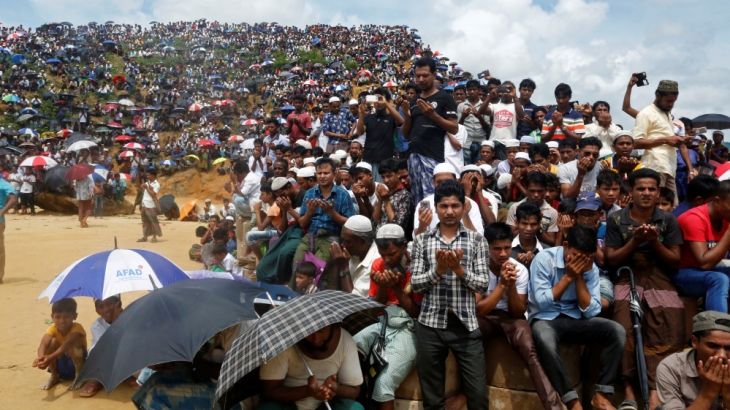ICC approves probe into Myanmar’s alleged crimes against Rohingya
Judges approve request to investigate alleged crimes against humanity over Myanmar’s crackdown against ethnic group.

The International Criminal Court (ICC) has approved a full investigation into Myanmar‘s alleged crimes against the Rohingya, as the Southeast Asian nation faces mounting legal pressure worldwide over the treatment of the minority ethnic group.
ICC judges on Thursday backed a prosecution request to investigate allegations of crimes against humanity and persecution over Myanmar’s bloody 2017 military crackdown against the majority-Muslim group.
Keep reading
list of 3 itemsMyanmar: Who are the Rohingya?
‘Not a word’: Aung San Suu Kyi criticised over Rakhine silence
The ICC’s decision came after Aung San Suu Kyi, Myanmar’s de-facto civilian leader, was named in an Argentine lawsuit over crimes against the Rohingya and Myanmar faced a separate genocide lawsuit at the United Nations‘s top court.
More than 740,000 Rohingya were forced to flee over the border into sprawling camps in Bangladesh, in violence that the UN investigators said amounted to genocide.
The Hague-based ICC, set up in 2002 to try the world’s worst crimes, said it had “authorised the prosecutor to proceed with an investigation for the alleged crimes within the ICC’s jurisdiction” relating to Myanmar.
These include allegations of “systematic acts of violence”, deportation as a crime against humanity and persecution on the grounds of ethnicity or religion against the Rohingya, it said.
Welcoming the moves towards international justice, George Graham, Director of Children and Armed Conflict at Save the Children said there was an “overwhelming need” to investigate and prosecute the crimes that had been documented.
“The scale and intensity of violence committed against the Rohingya by Myanmar security forces demands an independent and impartial hearing in a court of law,” Graham said in a statement.
“Rohingya boys and girls were killed, raped and witnessed horrific human rights violations. Approximately half a million children have been displaced into neighbouring Bangladesh – where nearly one in five are experiencing mental distress. They are entitled to their day in court.”
Myanmar has long denied accusations it committed ethnic cleansing or genocide.
Myanmar is not a member of the ICC, but the court ruled last year that it has jurisdiction over crimes against the Rohingya minority because Bangladesh, where they are now refugees, is a member.
Chief ICC prosecutor Fatou Bensouda was allowed to open a preliminary investigation on Myanmar in September 2018, and formally applied to begin a full-scale formal investigation in July this year.
|
|
International justice
The wheels of international justice have turned slowly when it comes to abuses against the Rohingya, but this week, they finally creaked into action.
West African nation The Gambia on Monday launched a case at the International Court of Justice (ICJ), the UN’s top court also based in The Hague, accusing Myanmar of genocide.
First hearings by the case, which The Gambia filed on behalf of the 57-nation Organisation of Islamic Cooperation are due to take place in December.
The ICJ normally deals with more legalistic disputes and border issues between states but has recently been drawn into cases involving alleged breaches of UN conventions on genocide and “terrorism”.
The ICC case, meanwhile, will focus on individual, not state, responsibility which could, in theory, lead to arrest warrants being issued for Myanmar’s generals.
“It’s a long process that we are just at the beginning of,” Akshaya Kumar, Human Rights Watch’s Director of Crisis Advocacy, told Al Jazeera from the United States.
“But this court really does have the potential to provide a unique kind of justice; a justice on a really global scale.”
|
|
Meanwhile, Aung San Suu Kyi was among several top Myanmar officials named in a case filed in Argentina for crimes against Rohingya, the first time the Nobel peace laureate has been targeted in legal action over the issue.
Rohingya and Latin American human rights groups submitted the lawsuit in Argentina under the principle of “universal jurisdiction”, a legal concept enshrined in many countries’ laws.
The lawsuit demands top military and political leaders – including army chief Min Aung Hlaing and civilian leader Aung San Suu Kyi – face justice over the “existential threat” faced by the majority-Muslim Rohingya minority.
Courts in Argentina have taken up other universal jurisdiction cases, including in relation to the former dictator Francisco Franco’s rule in Spain and the Falun Gong movement in China.
UN investigators last year branded the 2017 military crackdown in Myanmar “genocide” and called for the UN Security Council to refer the case to the ICC.
But that will no longer be necessary now that the ICC has launched an investigation of its own.
Myanmar has yet to comment on the latest three cases filed against it.
The country insists its own investigative committee is able to look into alleged atrocities – even though critics dismiss the panel as toothless and biased.
The Rohingya garner little empathy inside Myanmar with many people supporting the 2017 military campaign, buying the official line it was a necessary defence against fighters and that the Muslim minority are not citizens.